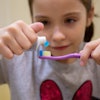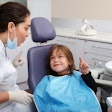More children on Michigan's Healthy Kids Dental (HKD) program received amalgam and composite restorations than children enrolled in Medicaid, according to a study presented at the International Association for Dental Research meeting last month.
Researchers from the University of Michigan investigated whether Medicaid-eligible children in Michigan receive different levels of dental care under Medicaid versus Healthy Kids Dental programs. HKD is administered by Delta Dental of Michigan with compensation near market value, the researchers noted.
Using dental claims from 2002 to 2005 for Medicaid and the HKD programs, the study included 6,071 HKD-enrolled children who received 13,548 total restorations, and 18,767 Medicaid-enrolled children who received 44,708 total restorations in 2002.
Amalgam and composite restorations placed on permanent posterior teeth (excluding third molars) of children ages 6 to 12 in 2002 were followed up to assess failure rates using child unique ID, tooth number, procedure code, and involved surfaces.
Retreated (failed) restorations were defined as any subsequent restorative procedure involving the same surface, or endodontic treatment or extraction of the same tooth. Covariates included insurance program type and also age, gender, and the length of enrollment of the child.
A greater proportion of HKD children received retreatments on posterior amalgam restorations (18%) than Medicaid children (15%), the study found. Some 57% of Medicaid providers placed at least one failed amalgam restoration and had a mean of 7.9 failed restorations per provider.
Comparatively, 49% of HKD providers had failed restorations with a mean of 3.7 per provider. Composite restorations showed a similar trend.
The study also found that a greater proportion of HKD children returned to their original dentist for amalgam retreatments than those enrolled in Medicaid (61% versus 43%).
"The higher utilization rate among HKD-enrolled children may explain the higher retreatment rates," the researchers concluded.



















